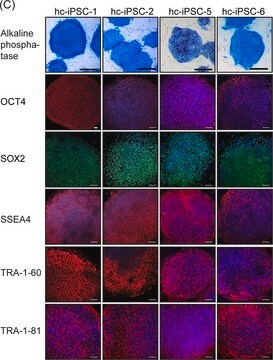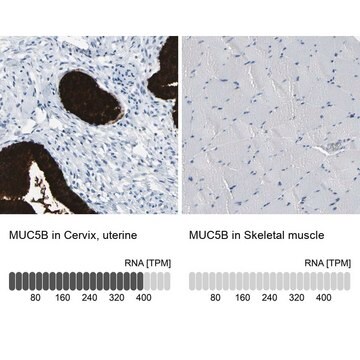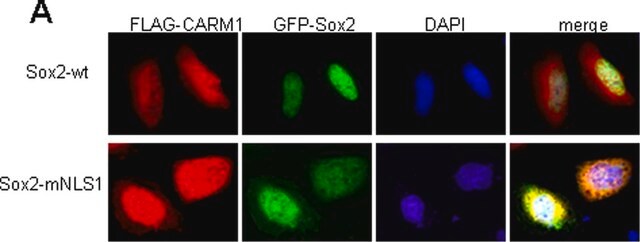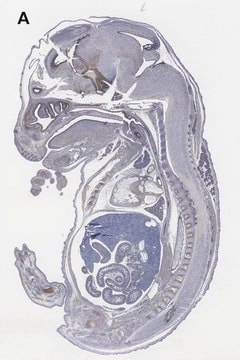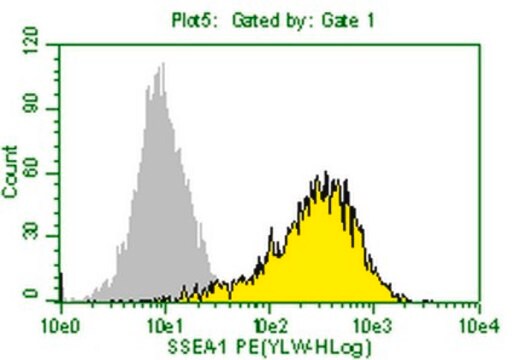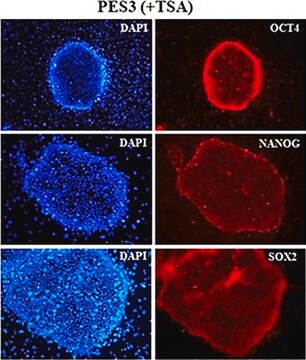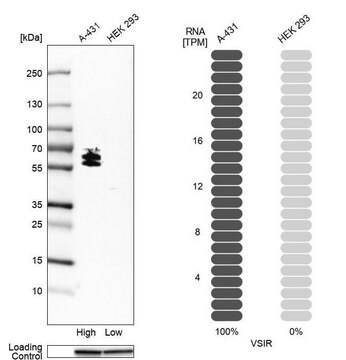FCMAB116P
Milli-Mark Anti-SSEA-4-PE Antibody, clone MC-813-70
clone MC-813-70, Milli-Mark®, from mouse
About This Item
Polecane produkty
pochodzenie biologiczne
mouse
Poziom jakości
białko sprzężone
PE
forma przeciwciała
purified antibody
rodzaj przeciwciała
primary antibodies
klon
MC-813-70, monoclonal
reaktywność gatunkowa
human
producent / nazwa handlowa
Milli-Mark®
metody
flow cytometry: suitable
immunocytochemistry: suitable
izotyp
IgG3κ
Warunki transportu
wet ice
docelowa modyfikacja potranslacyjna
unmodified
informacje o genach
human ... FUT4(2526)
Powiązane kategorie
Opis ogólny
Specyficzność
No immunoreactivity is evident with undifferentiated murine EC, ES and EG cells. Expression of SSEA-4 is down regulated following differentiation of human EC cells. In ctontrast, the differentiation of murine EC and ES cells may be accompanied by an increase in SSEA-4 expression.
Immunogen
Zastosowanie
Pluripotent human ES cells exhibit strong immunoreactivity to this antibody.
Immunocytochemical staining of fixed H9 human ES cells incubated for 2 hours at 2-8oC with 1:50 dilution of anti-SSEA-4, clone MC-813-70, PE conjugated (Cat. No. FCMAB116P) monoclonal antibody.
Pluripotent human ES cells exhibit strong immunoreactivity to this antibody.
Stem Cell Research
Pluripotent & Early Differentiation
Postać fizyczna
Przechowywanie i stabilność
Komentarz do analizy
Pluripotent human embryonic stem (ES) cells
Informacje prawne
Oświadczenie o zrzeczeniu się odpowiedzialności
Nie możesz znaleźć właściwego produktu?
Wypróbuj nasz Narzędzie selektora produktów.
Kod klasy składowania
10 - Combustible liquids
Klasa zagrożenia wodnego (WGK)
WGK 2
Temperatura zapłonu (°F)
Not applicable
Temperatura zapłonu (°C)
Not applicable
Certyfikaty analizy (CoA)
Poszukaj Certyfikaty analizy (CoA), wpisując numer partii/serii produktów. Numery serii i partii można znaleźć na etykiecie produktu po słowach „seria” lub „partia”.
Masz już ten produkt?
Dokumenty związane z niedawno zakupionymi produktami zostały zamieszczone w Bibliotece dokumentów.
Nasz zespół naukowców ma doświadczenie we wszystkich obszarach badań, w tym w naukach przyrodniczych, materiałoznawstwie, syntezie chemicznej, chromatografii, analityce i wielu innych dziedzinach.
Skontaktuj się z zespołem ds. pomocy technicznej